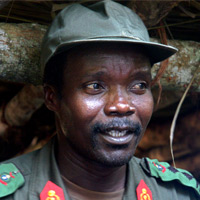

Bangadi, Haut Uele District, Province Oriental, Democratic Republic of the Congo.
I wasn’t planning to spend much time in Bangadi, a small town in Dungu territory in remote northeast Congo, only about 65 kilomoters from the border with southern Sudan. But when mechanical difficulties grounded the flight that was supposed to pick me up, I had no shortage of time to learn more about the residents of the town and their deadly encounters with the Lord’s Resistance Army, or LRA.
I interviewed the senior local government administrator in Bangadi, Joseph Bikwalubi Musafiri, about the security situation in LRA-affected areas. Originally from Maniema province, Mr. Bikwalubi took up his post mid-2007, and has watched the population of the town almost double in size as the residents of surrounding villages took refuge from LRA attacks, swelling the population from 15,000 to more than 26,000, according to a recent census by a local Congolese organization. As our conversation drew to a close, I asked the administrator if he could introduce me to any local citizens who had been abducted by the LRA. I was taken aback by his reply. “I myself was kidnapped by the LRA,” he told me. “My story is especially interesting because it is about a local government authority kidnapped by the LRA.”
He went on to tell me his story.
Ambushed
The first LRA attack against Bangadi took place on October 18, 2008. Mr. Bikwalubi, as well as the rest of the town’s inhabitants, fled into the bush where he spent nearly two months on the run. He returned to Bangadi around Christmas of 2008, following the Operation Lightning Thunder operations by the Ugandan and Congolese armies. At around noon on Thursday, January 22, 2009, Mr. Bikwalubi was on his way to his fields—like other civil servants in Congo, his wages are small and irregularly paid, so he has to find other ways to make ends meet—when a group of 21 LRA fighters ambushed him. “They sprang from the bush at a bend in the road, encircled me, took away my bicycle and asked me to follow them in the bush. They all were well armed with AK-47 rifles. One of them carried a MAG machine gun, and another even carried a bazooka!”
Two kidnapped Congolese were among the fighters, serving as guides and interpreters. These two Congolese had dreadlocks just like the LRA fighters, and also wore uniforms and carried weapons. Mr. Bikwalubi remembered that “their Commander was short and had a large scar on the right cheek and all its teeth were outside. He might have been wounded by a bullet.”
Living in captivity
The LRA brought Mr. Bikwalubi into the bush, where they were already holding a group of civilians from his town. There were 16 people in total, including three women and four young girls. When I asked about the living conditions while he was captive, he lowered his head to express his sadness and told me: “We really lived under difficult conditions. We slept on the ground, without any mattress or blanket, in the cold. We were bound together like slaves, our hands tied to the same cord to prevent escape. During the night, the LRA would take the women and girls. They would force the men to carry heavy loads of food they have plundered from the villages they burned.”
He told me that the LRA would strike them on the back with sticks, or with the backsides of their machetes. One fighter had slashed his feet with a razor blade because he was not walking quickly enough. He showed me the scars on his feet. They would walk all day in the bush, going from village to village, in search of abandoned food.
I asked him about how his citizens reacted when they saw him kidnapped by the LRA. But he said the better question was about his reaction to seeing his citizens in captivity. He asked them not to let the LRA know that he was a civil servant. “That is what saved my life,” he went on as saying. “I am convinced that they would have killed me if they knew that I was the administrator of Bangadi”. His fears were justified: on December 14, 2009, the administrator of Tapili, a village approximately 60 kilometers south of Bangadi, was abducted and killed by the LRA.
Released
When I asked how he came to be free, Mr. Bikwalubi told me that they were freed at the request of another LRA Commander whom they had met in the bush after their long walk. This commander seemed to outrank their captor, and had plans to move them far from Bangadi territory, until he learned that Ugandan and Congolese armed forces were tracking them. It seemed that they received an order to quickly vacate the region. Before their release the LRA beat them severely, and gave them a message for the population and local authorities: “Go tell the population that we will be returning again. No soldier of the Ugandan army, the Congolese army or MONUC [the U.N. peacekeeping mission in Congo] should be there. We do not want to see self-defense forces organizing against us, or to find even one weapon. Or else we will kill all in our way.”
Afterwards I asked several local people about the administrator’s story, who all confirmed what he had told me. One person added: “When even the local political and administrative authorities are not spared by the LRA, what can beleaguered civilian populations expect? Just imagine about how ordinary women and children are treated?”

